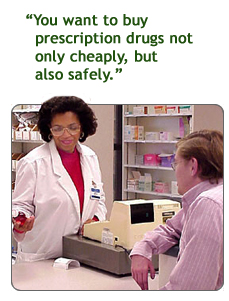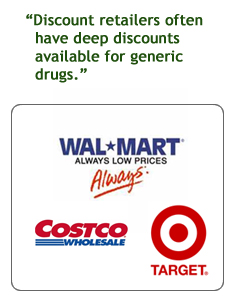 Along with food, clothing, and shelter, something else is a necessity for the health and well-being of a whole lot of Americans -- prescription medications. Up to 15 percent of us, from twenty-somethings to older Americans, take at least one prescription medicine. One in three Americans between the ages of 57 and 85 takes at least five prescription drugs.
 That can be a huge expense, especially if you don't have health insurance or if your plan doesn't cover prescription drugs. In fact, almost 20 percent of Americans have a problem paying for their needed meds.
Fortunately, there are strategies to help you get the best deals on your prescription drugs -- particularly those you need on a regular basis -- and finding the lowest prices can add up to hefty savings over the course of months and years.
You want to buy prescription drugs not only cheaply, however, but also safely. And that isn't always as simple as doing a web search for the cheapest price.
For example, some of the widely touted money-saving "facts," such as "always opt for a cheaper generic drug over a brand name medication if available" and "Canadian pharmacies carry the identical drugs as American pharmacies, only they are cheaper" aren't necessarily accurate. What's more, do-it-yourself attempts to save money by skipping or lowering your prescribed dosage to save money can be downright dangerous.
Bargain hunting onlineGoogle. Point. Click. If you have a computer, you are probably used to searching the internet and shopping online, too. When it comes to looking for the best prescription drug deals, DestinationRx Prescription Drug Price Finder can save you time and money. It lets you compare drug prices for generics and brand-names at online, mail-order, and retail pharmacies. The site, which is free to join, also has information on drug side effects and safety, and it helps seniors compare and apply to Medicare Part D plans.
No matter how much money you save on your meds, they are not good deals if they don't work or make you sick. So, if you are shopping online, you need to make sure you are dealing with a safe source where the drugs you order are not counterfeits, contaminated, expired, or otherwise damaged.
 "These problems are almost unheard of when you are getting prescriptions filled at either a brick-and-mortar or internet pharmacy that is licensed in the United States," says Marjorie Shaw Phillips, Medical College of Georgia health and clinical professor of pharmacy practice at University of Georgia College of Pharmacy.
When you shop for medications online, make sure the pharmacy site has a toll-free access number. You need to be able to talk to registered pharmacists if you have medication questions or are concerned about possible drug reactions. Before you place an order, check out the privacy and security policies of the website, too, so you'll have assurance that your credit card number, personal health information, and other personally identifiable information will be protected.
Here are some ways to identify legit online pharmacies:
Foreign pharmacies online: the real dealIt's important to take extra caution if you try to save money by buying drugs from international websites.
"There are some reports from Eastern Europe that up to 50 percent of medications patients receive may be counterfeit," says Philips, of the Medical College of Georgia. "The FDA and U.S. Customs did a 'sting' operation a couple of years ago where they ordered medications over the internet from sites labeled as Canadian internet pharmacies. It turns out the medications that were shipped came from many other areas of the world, including India, the Bahamas, and China, and included a number of counterfeit drugs.
"Some of these are the same ingredients but made at an unregulated plant being passed off as brand-name drugs, while others may include different ingredients, or no active medication at all -- and the only way to know is through a chemical analysis. So, I advise buying only from an internet pharmacy that has been licensed to do business in the U.S. by the National Association of Boards of Pharmacy."
The media has buzzed with controversy over whether Americans should be allowed to buy prescriptions from Canadian pharmacies, which tend to be better regulated than those of other foreign countries. If you are determined to shop for drug bargains from Canada, here are points to keep in mind:
- Although generic drugs are usually cheaper in the U.S., brand-name medications from Canada can be less. In fact, consumer advocate Clark Howard says those Canadian prescriptions may be 50 percent less expensive. However, an FDA report concludes consumers who buy prescription drugs from unregulated foreign internet sites may be saving less than they think, or even spending more than if they were careful shoppers.
- Don't forget to factor in extra costs when you buy drugs online. The FDA reports that handling charges at Canadian pharmacies can range from $15 to $30 per order.
- Drugs bought from Canadian pharmacies don't count toward Medicare Part D deductibles.
- Look for pharmacies with the Canadian International Pharmacy Association seal. Pharmacy Checker, an independent group that evaluates online pharmacies, lists the highest-rated sites at www.pharmacychecker.com.
 Local pharmacy or discount store advantagesBeing a savvy drug shopper means comparing prices locally, too. You may find better deals around the corner at your neighborhood pharmacy, discount retailer, or wholesale club, than on the internet. A Consumers Union report discovered that over-65 residents in Broward County, Florida, could find much lower prices than those offered through their Medicare Part D plans when they shopped carefully. A case in point: a month's supply of the antidepressant Zoloft was $77.72 at a Sam's Club but almost $25.00 more through a Medicare plan.
Discount retailers often have deep discounts available for generic drugs. For example, Costco charges $10 for 100 capsules of more than 250 different generic drugs (www.costco.com or 800-774-2678). Wal-Mart charges $4 for a 30-day supply of some 360 generics. Visit www.walmart.com, or call 800-925-6278 for more information. Target also offers many $4 generics. For a list of currently available meds, go to www.target.com, or call 800-440-0680.
There are other reasons why buying drugs from a nearby store can be your best decision. If you run out of your meds and didn't plan ahead, you can have your prescription refilled faster and easier than if you ordered online. "Also, having a real live pharmacist you see every month is a great way to get a periodic medication check-up and also be better informed on how to safely and effectively use your medications," Phillips points out.
"Patients are going to be more likely to ask questions if the pharmacist is immediately accessible. Being able to talk to the pharmacist is also important to ensure you know how to correctly use special dosage forms, such as inhalers and eye drops. Your personal pharmacist is also a great source of information and may be able to suggest ways for you to streamline your medication list or identify alternative medications to discuss with your doctor(s)."
More prescriptions for savingIf you have a health insurance plan that includes PBM (pharmacy benefits managers) prescription coverage, find out if you are entitled to any special discounts at certain online pharmacies. Medco (www.medco.com), for instance, offers PBMs of small-to-midsized businesses a 90-day supply of most generic drugs for $10. PBMs may also use a mail-order service like Express Scripts (www.express-scripts.com) that can offer substantial savings.
What if you have no insurance and just can't afford your medications? There are resources available to help, if you do some homework. According to the FDA, many pharmaceutical companies offer programs that allow consumers to take a discount drug card to a pharmacy for reduced prescription prices and many offer PAPs (Patient Assistance Programs), which provide free or low-cost prescription medicine to low-income people who are uninsured or under-insured and meet specific guidelines.
The American Society of Health-System Pharmacists provides a list of available drug assistance and discount drug cards here.
 Talk to your doctorBefore you shop for drugs, talk to your doctor. It may seem like a no-brainer, but not everyone asks their health care provider exactly what they are taking and why. If you need medication regularly for chronic conditions, such as diabetes, hypertension, or heart rhythm problems, it is particularly important you understand how much of the drug you need to take and when. Deciding on your own to save money by taking your meds every other day or in lower doses than prescribed could cause serious health problems.
Speak up and find out if there are alternatives to prescription drugs for certain problems, too. For example, if you are going through a stressful time and your doctor suggests an anti-anxiety medication or prescription sleep aids, ask if there are less expensive, or free, lifestyle changes you might try first, such as an exercise program, yoga, or relaxation tapes.
Generic medications are usually far cheaper than brand-name drugs and usually a smart way to save money. But if your doctor has prescribed a brand-name med, there can be a good reason why you should not go with a substitute brand, even if it is much cheaper.
"The FDA has a reference indicating which generic medications they consider equivalent to brand name medication. For 99 percent of the medications in use, there is no question that the generic version is just as good, and it may be made by the same manufacturer and even in the same plant as the brand name," says Phillips.
However, she points out that some conditions, such as seizures, need to be treated with drugs that have a consistent, "therapeutic index" (the small difference between desired effect and toxic effects). In that case, taking even a slightly less or increased dosage when you vary brands could cause you to have symptoms such as, in the case of epilepsy, a seizure.
"So you do not want to switch between brands or between a generic and a brand-name and back again to save money," Phillips says. "That's why your doctor may write on your prescription terms like 'Brand Necessary' or 'Do NOT Substitute.' If that's the case with a drug you need to take regularly and you'd like to save money with a generic, talk to your doctor to see if that's a safe option before you shop around for a cheaper substitute."
|